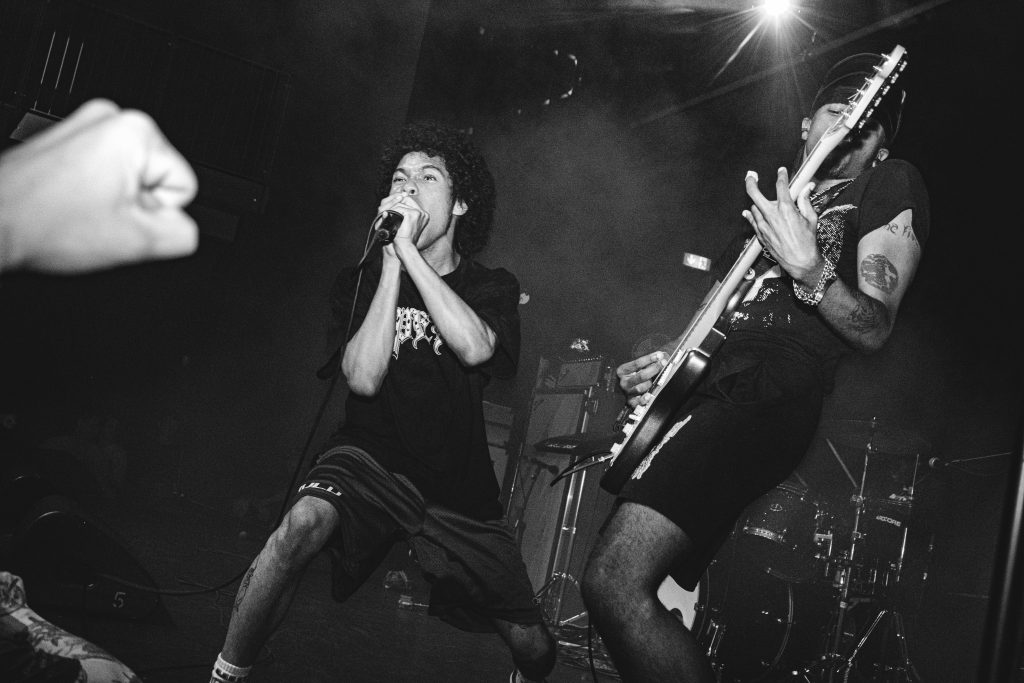
Deep in the depths of Neukölln, in Berlin’s Hole 44, ZULU, hailing from the sun-drenched streets of Los Angeles, is an unapologetic hardcore punk, powerviolence, and metalcore band, colliding with the sonic force of SPEED, a hardcore band from the vibrant melting pot of Sydney, Australia.
On a stormy June 22nd night, both bands unleashed a raw and edgily passionate performance, delving deep into their musical, cultural, and political identities as fierce BIPoC (Black, Indigenous, People of Color) artists in the alternative music scene. Being amidst a hardcore crowd, it was hot, wet, sweaty, angry, and gritty all at once, much like the stormy Berlin weather outside. The thunderstorm was a foreshadowing of the released power of the music in the coming night.
Although ZULU conveyed so much more political and existential power through their music, it was obvious that some of the crowd could not even fathom the importance of their messages and just succumbed to sheer animal instinct – but not the smart kind. It also ignited the animal instinct in me: to avoid the toxic masculinity that some of the hardcore crowd induced. However, as my soul was being inducted into the sonic magic of ZULU, I found a part of the crowd that shared my sentiment, and we laughed at the patriarchy and delved deeper into the performance by feeling the sounds of rebellion and expressing it through camaraderie and dance.
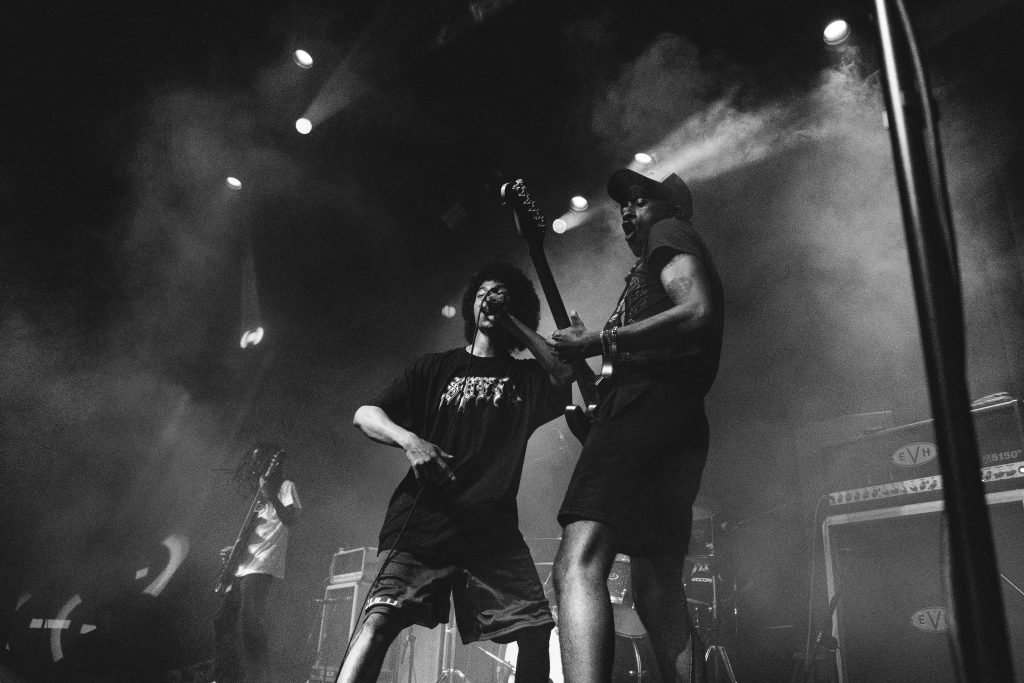
During the interview, prior to the concert, we met two members of ZULU on the staircase backstage – Braxton (Guitar) and Christine (Drums). It was the second time we met, as they had also toured Europe last year in 2022. During our conversation, DECOLONOIZE asked about their creative process, and ZULU stripped down to how they created “The New Tomorrow,” their latest album. It was all about collaboration, with band members sharing riffs and ideas back and forth in a digital mosh pit of creativity. Having an exchange of ideas online, they were able to record the album with Christine’s percussive skills, which added thunderous fills and enigmatic nuances during the intense recording sessions.
When it came to choosing samples that punctuated their tracks, ZULU gave props to Dez and Anaiah, the architects of their sonic amalgamation. When asked if they preferred touring or recording, Braxton and Christine shared their passion for both the wild energy of live performances and the seductive allure of the studio, where audio production and mixing whispered secrets of sonic defiance.
When asked how to keep mentally and physically fit on tour, they expressed that surviving the road was their battle, and ZULU offered no-nonsense advice: drink water like it’s your lifeline, safeguard your mental fortitude, and load up on fruits and veggies for vitality.
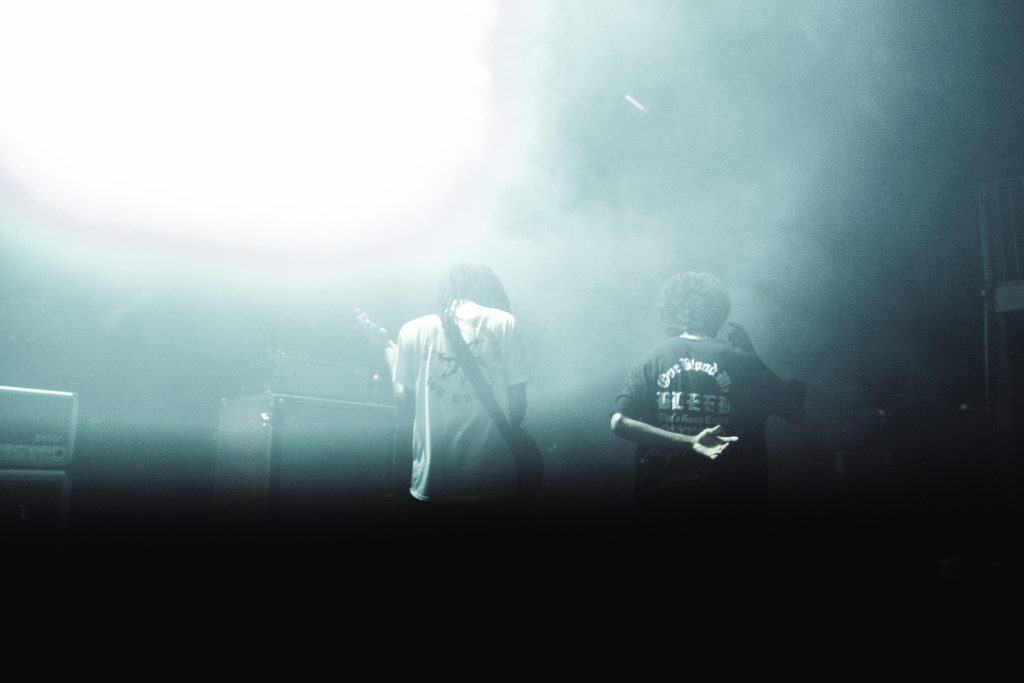
As BIPoC artists take over European stages, ZULU shared tales of their triumphs abroad. They found that Germany had a warm embrace, and the overall open-minded curiosity of European audiences lit their fire. As Europeans are not used to the sound of ZULU, like the crowds in the US are, most do not know what to expect, and so the band revels in turning confused gazes into thunderous acceptance.
While in conversation about the diversity of the music scene, ZULU and their fervent desire echoed through the void: a call for more queer, FLINTA*, and BIPoC musicians to seize their place in the alternative music scene, shattering stereotypes one fierce beat at a time.
In this pivotal moment of the interview, ZULU (Christine) articulated a profound message that needs to be conveyed. While acknowledging the progress in supporting female and femme presenting artists, they emphasized that challenges still persisted in 2023. ZULU’s words served as a rallying cry to aspiring FLINTA* musicians, urging them to press on, undeterred by societal expectations, as the present moment beckoned all FLINTA* to claim their rightful place in the spotlight.
Leaving the more political spectrum, we return to the auditory landscape of their latest album. The interlude on “The New Tomorrow” was a powerful artistic statement, challenging stereotypes that confine black artists to narratives of hardship. “Must I Only Share My Pain?” defied convention and embraced the rich tapestry of their experiences being BIPoC in America. Their eclectic inspirations formed a tapestry of defiance, paying homage to legends like Jimi Hendrix and Erykah Badu while drawing strength from personal musical connections that ignited their passion.
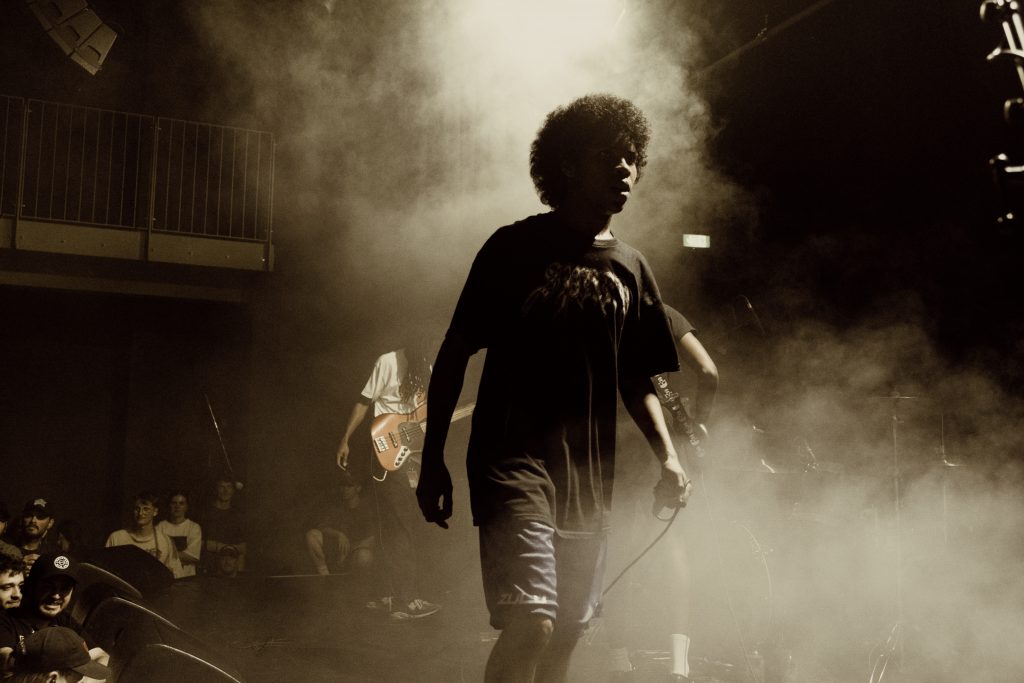
ZULU has masterfully unveiled an alchemical synthesis wherein the weighty hardcore riffs, punching percussions, and soulful elements, alongside remnants of jazz, coalesced harmoniously within their music. This remarkable musical tapestry, mostly artfully crafted by Dez’s creative genius, birthed a sonic renaissance that defied conventional genre boundaries.
Back to the mosh pit of the dimly lit Hole 44, ZULU’s concert on a June fateful summer storm night was an unrelenting and edgily passionate odyssey. Their music reverberated with an urgency that ignited collective rebellion and understanding of oppression. The room pulsated with palpable tension, a fusion of liberation and introspection. ZULU’s power formed a bridge between inner turmoil and the communal catharsis of their concert.
In the end, ZULU’s Berlin gig was more than a mere performance; it was a passionate call to arms, a celebration of resilience, and an unapologetic expression of their art. Their edgy, collective coolness ignited an eternal blaze that will forever burn in the hearts of devoted fans and newcomers alike.
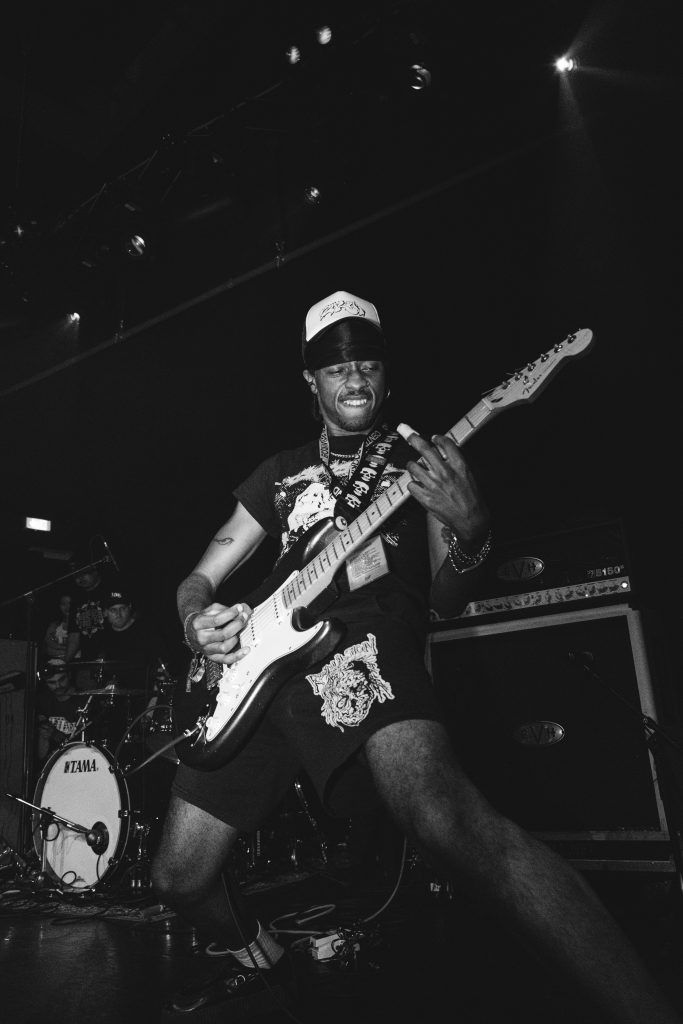
INTERVIew Transcript
DECOLONOIZE:
So you released this amazing new album this year “The New Tomorrow”. And we want to ask you, how was your com composition process? How do you, how are you composing? Who’s, how was your process together? Who’s coming up with the samples? How do you build them in?
ZULU :
Braxton:
We had like a group chat, just sending riffs and just sending riffs and stuff in the chat. Like I was sending riffs, Sato was sending bass stuff, Christine was sending drum stuff. Yeah
Christine:
Yeah, on the album I, uh, I didn’t really write the whole, like, meat and potatoes of the drums, but like most of the fills and little nuances on there is definitely me. 80% of that recording was me on the drums. Uh, so yeah, I didn’t really get to put in my ideas until the recording process.
DECOLONOIZE:
So you made that in the studio and you fixed it all together?
ZULU (everyone):
Yeah, we fixed it for a month. Yeah, for a whole month. Yeah, it was crazy.
DECOLONOIZE:
So, and the samples, how do you pick them?
ZULU:
Braxton:
Dez and Anaiah. Yeah, Dez and Anaiah’s like, that’s their thing. That’s like their base. So yeah, that’s something you would have to talk to him about.
DECOLONOIZE:
So you spend a lot of time in the studio, and you also tour a lot. What do you prefer? Live playing? Tour playing? Or studio time?
ZULU:
Braxton:
I love touring. Personally, I love studio time, cause I’m just like an audio nerd. Like I love looking at all the gear and shit and like mixing and shit. But I also love live performances, just seeing how people react to the music.
I really love seeing that.
DECOLONOIZE:
So, For you it’s definitely touring?
ZULU:
Braxton:
Yeah, I love touring. Yeah, it’s sick. It’s really sick.
DECOLONOIZE:
And what’s your favorite thing about touring?
ZULU:
Just being in a different place every day. Yeah, like, just seeing the world. I just know performing in front of a crowd, that’s always so sick to me.
DECOLONOIZE:
I agree. But touring can also burn you out. How do you stay healthy on tour? Can you give us your three top advice on staying healthy and making it sustainable?
ZULU:
Braxton:
Water. Easy, okay.Um, and like sleeping, and like eating like fruits and veggies.That’s pretty much it. I’m like my grandma. Drink water, eat fruits.
Christine:
Yeah. Um, I’d say… Having personal time because like you’re around four other people all day. So getting time to be by yourself for like an hour or two – it really will help you. Just like going for a walk putting your earplugs in, maybe put on a show on Netflix or something like that.
Uh, just something to help really be in your own bubble for a second. And just really come back to Earth. Um, and the second thing would be obviously: drink water, like stay hydrated. Cause it’s very easy to forget to drink water when you’re on tour. Even to eat. And then, I guess the third thing would be uh, I don’t know.
Yeah, I don’t know. I don’t think I have a third thing. Those two things for me, yeah.
DECOLONOIZE:
What’s your experience as an artist in this scene, especially being BIPoC? and how do you feel playing this festivals in Europe? And also what’s the comparison to, to alternative music scene in the States?
ZULU:
Braxton:
I don’t know, especially in Germany, surprisingly, I think I’m treated really nicely. I didn’t really know what to expect but I think it’s kind of more open minded out here. But, uh, that’s pretty cool. I’d say, I mean it’s definitely different, um, I like looking into the crowd and see people’s faces and they’re all confused, like kind of scared, but then they come around to it. In America you don’t really, you don’t get that kind of reaction cause they already know what’s gonna happen, so I love seeing the Europeans and everyone else freaking out like “what are they about to do” and then they’re like, oh this is sick, yeah, so I like that.
DECOLONOIZE:
Great. And do you think there’s anything lacking in the alternative BPSC scene or just in the alternative scene in general?
ZULU:
Christine:
I don’t know. I guess for me, I would just love to see more queer, femme, black women. Like, I don’t really see, especially female drummers, like I want to see more of that.
DECOLONOIZE:
You have this interlude on your new album, “Must I only share my pain” could you elaborate a bit on this?
ZULU:
Braxton:
For me, it feels like that as a BIPoC artist, you always have to be very political in this place, or you have to share your pain to be visible. Is this the right thing, what you were thinking about, or is this something else? Yeah, there’s pretty much this deceptive idea of, like, black men always know what to talk about. It’s a pain in the butt. And…I mean, you can see me. You’re on the right track. Yeah, it’s just like, you know, you see Netflix or Black History Month and you see black stories, and it’s just like slavery stories, like slavery movies and stuff like that. It’s just always the constant struggle of talking about pain instead of like celebrating joy so I feel like that’s really what that is.
DECOLONOIZE:
I was just listening to the new album earlier, and I really like the amalgamation of the heavy sounds, and then in the middle there’s like little interludes of jazz and soul.
I wouldn’t say jazzy, but soul kind of vibe. So, um, how did you come up with that?
ZULU:
Braxton:
Like, it’s Dez. Yeah, it’s Dez. Dez and I are really close. Definitely, he’s like the jazz head in the band. So that’s like his thing. Um, I know he had a big part in, uh, Shine Eternally. That’s, a song that he had under his belt. Um. Yeah, but it’s good to have, those kind of, uh, different genres on the album. It was really nice to hear that. Um, yeah, Satchel mostly, yeah.
DECOLONOIZE:
Do you like to play around with it to not fit in genre wise? Is it like one thing that you have?
ZULU:
Braxton:
We didn’t really set out to just do other genres. It’s kind of, cause we all like different stuff. So, it just kind of happened that way. But now we’re definitely open to exploring new facets. Like, in the next career I think I want to explore that stuff.
DECOLONOIZE:
What’s your personal biggest influence? What made you go on stage and do this stuff for you? Is it an event? Is it a thing that you saw?
ZULU:
Braxton:
My dad was really into music. So I always saw guitar playing around when I was growing up.
So that was that. Anyway, Hila and Jimi Hendrix, those two, for sure. I mean, I have a Hila tattoo up here, that’s just like, for sure everything. So my dad and then anyway, Hila Hendrix. Yeah. Uh, I just, I fell in love with music when I was really young because of my brother. He showed me a band and uh, I was just hooked on them.
I’m not gonna say the band name. You can find any interview that says it, I say it like all the time. I don’t even want to say it right now. But, um, yeah, I found them and like the vocalist is really inspiring to me. And it was obviously a woman. And I was like, okay, like there’s a girl doing what I want to do.
And I was like, okay, I’m going to do this. And, uh, yeah, since then it’s just like, that’s all I’ve been wanting to do. And then now I’m here doing exactly that, so.
DECOLONOIZE:
That’s amazing.I had a friend that was touring back in the 90s, and they were telling me that it was really, really hard to be female or femme presenting (FLINTA*) touring back in those days. So, how do you feel now? Do you think there’s enough representation, or that it’s getting better, or that you’re treated better? So we just want to know if has that changed in your experience?
ZULU:
Christine:
Um, it’s definitely getting better. I’m seeing a lot more fems, and non binary people.
But it’s not great. I mean, there’s still a lot of work to do and I still encounter white cis men in the hardcore scene that just don’t understand what’s overstepping and what’s misogynistic. It’s every day. Um, yeah, I just, I know it was worse in the 90s, but like, it’s a little bit better now.
Like, I would… I would start a band. Now, if you ever wanted to, if you’re a female listening to this, start it now. Like this is the time. But also be aware that it’s not… it’s still not great. It’s not perfect and we’re still trying to make it better.
DECOLONOIZE:
So what tips will you give this person who will form, or think about forming a band?
ZULU:
Christine:
I’m not sure yet. Well for one, don’t give a shit about what a fucking man has to tell you. Like, you know, you could do whatever you want to do. If you wanna play guitar, play guitar. If you want to play. Like, it’s a woman’s world, in my opinion. Uh, you know, take your fucking stage, you know. Do what you gotta do.
DECOLONOIZE:
You mentioned that Germany is a bit nicer to you on tour. A why is that? how do they treat you differently?
ZULU:
Braxton:
I mean, there’s like deep cut parts of Germany that are definitely not nice at all. I was very sad, but. I don’t know. It just, I guess culturally it’s different. I really dunno.
I mean, I definitely get a lot of great looks, but I feel like they definitely appreciate us coming to play music over here more. They’re trying to carry us more cause they know, oh, you guys are touring here, so there’s more attentive trying to help us out and stuff. That’s what I’ve noticed.
Christine:
Mm-hmm. Me too. Yeah, it’s like more attentive. They definitely appreciate music a lot more out here. Okay. Like respect to artists, and I think that’s because maybe concerts are not as accessible as it is over in America. Like you can go to a local bar and it’s like, oh, there’s a band playing this weekend.
Braxton:
Like, fuck. But, you know here, it’s like, it’s not, I guess as regular to see. I don’t know. This is a different vibe. Like venues, even festivals treat their artists like royalty. It’s kind of crazy because in America they would give you just a bottle of water and you’d just fend for yourself, you know.
There’s some good food. You know, it’s kind of basically just like the bare necessities. So, yeah, I don’t know. It’s a nice change. I like it.
DECOLONOIZE:
Thank you for sharing your insights and experiences!
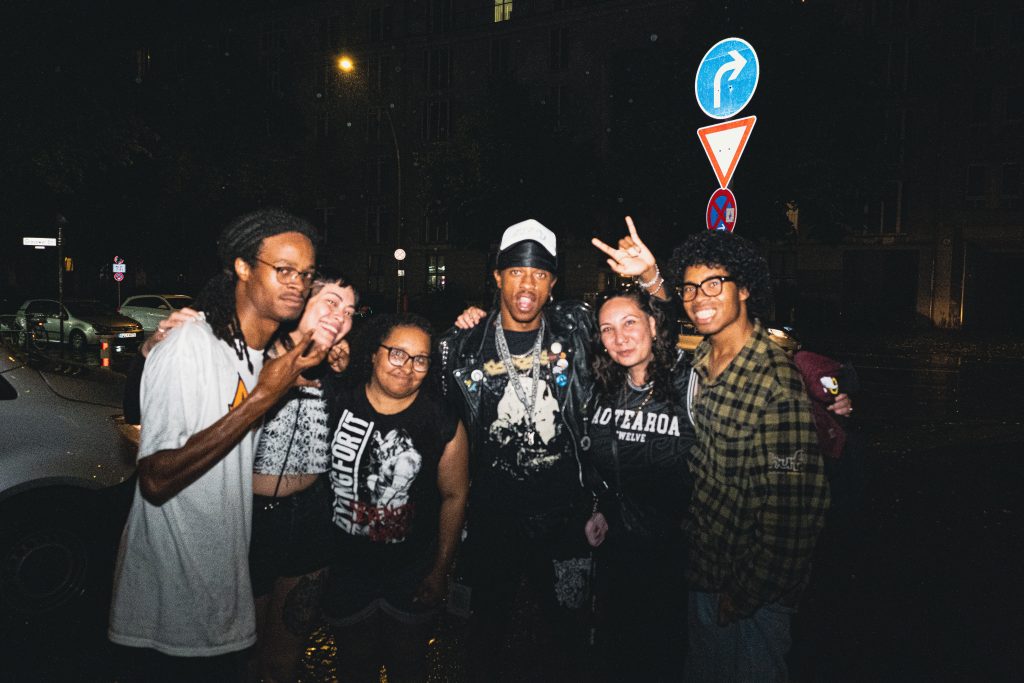
Left to right: Zulu’s Satchel Brown (Bass), Kim (Decolonoize Interviewer ), Lilian (My people Records), Zulu´s Braxton (Guitar), Margi (Decolonoize Interviewer) and Zulu’s Anaiah Lei (Vocals, Guitar, Bass, Drums)
Credits: Photographs by Oyémi, Interview by Kim and Review written by Margi